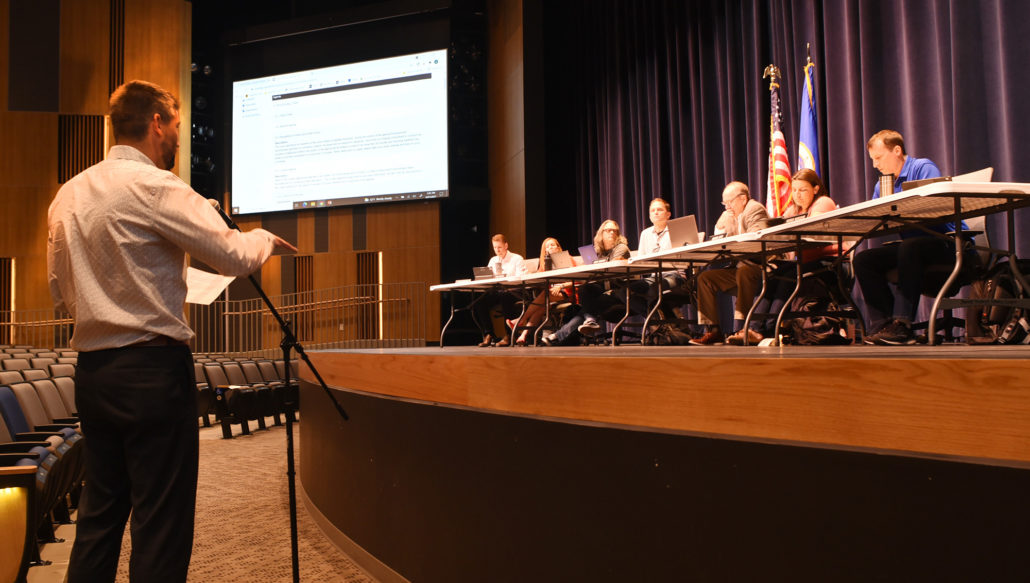by Mike Knaak
news@thenewsleaders.com
Equity Alliance MN presented its long-awaited report and recommendations at the June 21 Sartell-St. Stephen school board meeting, but not before 12 people, mostly opposed to the equity effort, spoke during the board’s open forum period at the beginning of the meeting.
Equity Alliance staff outlined findings of its study that included reviewing data, focus groups with students, staff and community members and observations of the district’s schools. The district’s effort to address equity, which promises that each student, particularly students of color, receive the support needed to be successful in school, picked up support following last summer’s killing of George Floyd. During a listening session in June 2020, students and parents shared stories of racism, and hurtful comments about religion and gender.
During the open forum, when speakers offer statements but the board doesn’t comment, about three-quarters of the speakers criticized the education equity project, and objected to the process and survey questions and how Equity Alliance MN was chosen. Some speakers tied it to the current nationwide debate about critical race theory.
About 125 people attended the meeting, meetings which are usually sparsely attended. Judging by the applause for each speaker, it appeared two-thirds to three-fourths of the crowd supported critics.
The report breaks down the research results into six topics, referred to as dimensions.
For each dimension, the report compiles the research and offers suggestions. For the next step in the process, the school board will review the recommendations and work with school and community leaders to come up with priorities and an action plan. That process is expected to take two or three months.
The 72-page report is available on the district’s web site at www.sartell.k12.mn.us/equityaudit.
The six dimensions are:
Systemic equity for students. The report found students are concerned about racism, homophobia and discrimination against people with disabilities. About two-thirds of students said they had not directly engaged in activities to teach about race, culture or understanding of others. Staff members reported a desire to hire more staff of color.
Efficacy of programs. Staff members were not aware of evaluation cycles, making it difficult to improve student programs. Students of color were not comfortable bringing concerns to leadership or adults. Staff and leadership held a different view of the MTSS program, a framework used to provide targeted support to struggling students.
Utilization of resources. The study found the district provided quality materials backed up with strong technology, but lacked resources for English-Language Learners. The report found a need for mental health and anti-bullying programs, increased cultural knowledge and diversity, and community concern about how the district spends its money.
Curriculum represents equity. Students are not satisfied with the curriculum, the report found. There’s a need for more professional development and to remove barriers for single-parent and low-income families.
Student-centered leadership. The study found high levels of positive rapport between adults and students but teachers dominated the discussions. The sense of community is affected by grade level and race. The staff says it thinks it’s important for students to lead, but that is happening less often than expected.
Inclusive communication. The consultants found a welcoming district. There’s a lack of multi-language signage and translations. While students felt safe in classrooms, they felt less safe in locker rooms and in counseling and school resource officer offices. Students thought racism is a problem while staff and leadership did not.
The report offered a series of recommendations for curriculum, board policies, professional development, community partnership and increasing student voice.
School board members, who received the report June 18, asked questions about the data and methodology but board member Patrick Marushin dug a little deeper. He asked Equity Alliance Executive Director Sebastian Witherspoon if there were any surprises in the research. Witherspoon said there were “not a ton of surprises.” But he said students in focus groups talked about a high level of anxiety and depression. In one group of 12, he said, they all said they suffered from anxiety and depression.
Students are doing well academically, he said, “but suffering is taking place.” He said his team has seen the issue in other places but not to the degree found in the Sartell-St. Stephen district.
Equity Alliance Director of Guidance and Programmatic Planning Tonya Sconiers said, “With high expectations, there needs to be high support.”

Steve Kron was one of 12 people who spoke during the open forum period at the June 21 Sartell-St. Stephen school board meeting.



